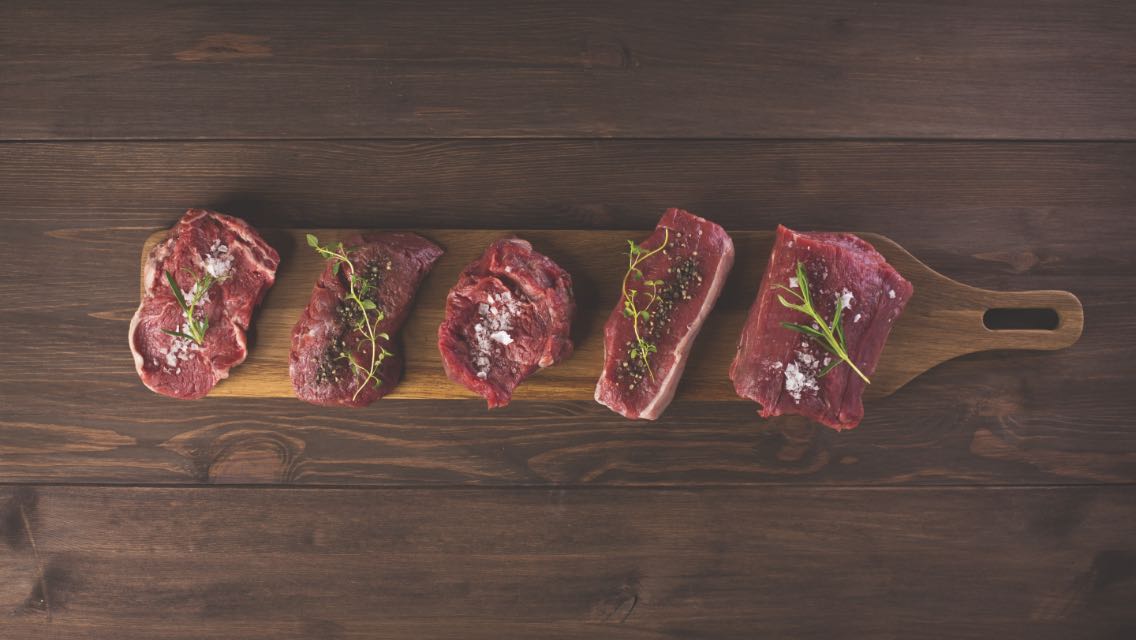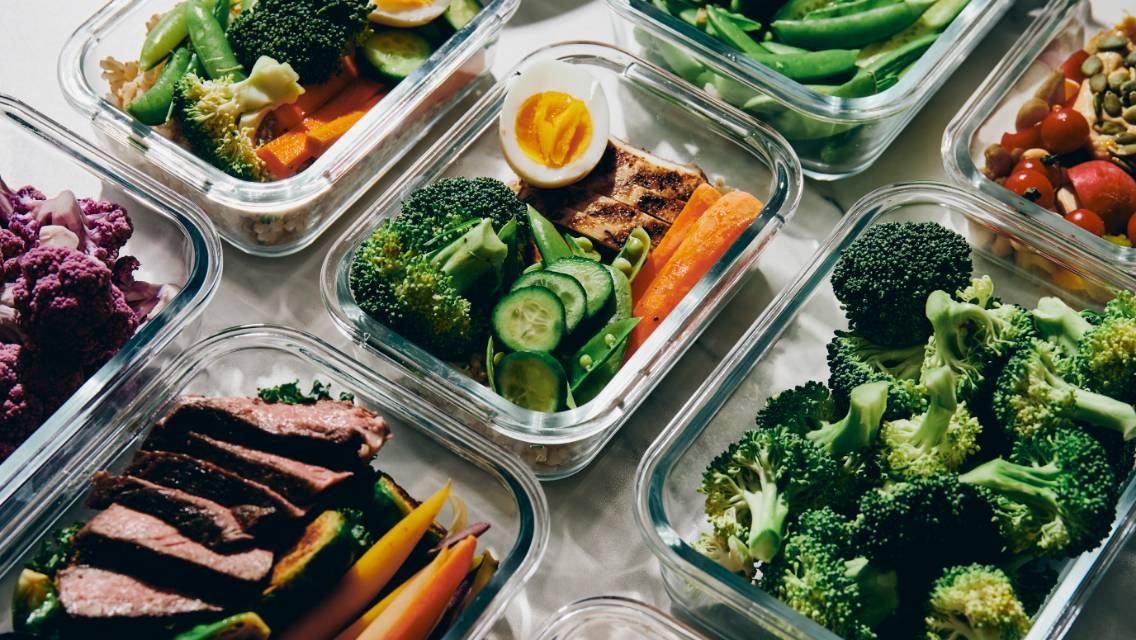What are the benefits of high-protein diets? Are there risks? Are the risks exaggerations by alarmists, or could you really eat too much protein?
Fat and carbohydrates have shared the nutrition spotlight for decades, while protein is rarely discussed. That’s too bad, because it’s this macronutrient that has the potential to transform your body the most.
- Science, Observation, and Experience
- What Is a High-Protein Diet?
- 9 Benefits of a High-Protein Diet
- High-Quality, Great Tasting Protein Sources
- Frequently Asked Questions
- I heard high-protein diets can cause kidney damage. Is that true?
- Is there a minimum or maximum amount of protein I should eat in a meal?
- Is there a maximum amount of protein you can use or assimilate in a meal?
- Do you need more protein or less protein as you age?
- Can you eat too much protein?
- What kind of protein is best?
- Do I need to time my protein with exercise?
- What if I don’t have access to grass-fed, wild-caught, organic protein sources?
- If I’m vegetarian or vegan, how can I get more protein?
- What if I have an allergy or sensitivity?
- What if I don’t like to eat protein?
- Time to Eat!
After almost two decades in health and fitness, I’ve determined there are just three things you can do that, if you do them consistently, dramatically improve how you look, feel, and perform more than anything else.
It’s these three things that I focus my attention on the most when coaching clients:
- Eat a high-protein diet.
- Weight train at least four days per week.
- Sleep at least seven hours every night.
Today, we’ll tackle the why and how of a high-protein diet.
Science, Observation, and Experience
Whenever I make a health and fitness recommendation, I do so based on what I’ve read, observed, and experienced.
Too many people play the “telephone game,” repeating what they think they heard someone else say. Often, that person heard something from someone else, too.
As the recommendations get passed from one person to the next, they get twisted, distorted, or exaggerated. As a result, there’s an enormous amount of confusion about — and over complication of — good nutrition.
I’ve read, researched, studied, and experimented with protein for years. As a certified sport nutritionist and certified strength and conditioning coach for more than two decades, I have a lot of experience with and knowledge about this.
More recently, researchers have started to ask the questions, “What would happen if people were just told to eat more protein? Is it possible that, if people ate more protein, they’d naturally eat less fat and carbohydrates?”
If so, a “healthy diet” wouldn’t be so much about eating less fat or carbohydrates, but more protein. Psychologically and physiologically, that’s a big difference.
By the way, I’m not suggesting carbs or fat don’t matter. They do. But, I’ve found it’s a lot easier to get people to eat healthier amounts of them by eating more protein, versus telling them to eat less of either one.
As you’ll see, there are a plethora of health benefits to protein, and little to no risks (contrary to what some bloggers and the media are selling today).
What Is a High-Protein Diet?
What is a “high-protein” diet anyway? The definition depends on who you talk to.
Researchers account for protein intake as a percentage of the diet’s total calories, or they measure it in grams based on weight.
Percentage-Based Protein Intake
Using percentages, a higher protein diet contains more than 15 percent of its total energy intake from protein. For example, a 2,000 calorie diet that includes more than 300 calories from protein (or ~75 grams) would be “higher protein.”
The Institute of Medicine set the acceptable macronutrient distribution range (AMDR) for protein at 10–35 percent of total calorie intake. So, in most cases, a diet where protein calories exceed more than 30–35 percent, it is considered “high protein.”
Again, using a 2,000 calorie diet as an example, that would be 600–700 calories, or about 175 grams of protein.
Although the percentages are helpful for designing a study in a clinical setting, I think this makes an individual’s diet way too complicated. You’d have to track everything you eat on a daily basis — and even the tracking itself is flawed.
Weight-Based Protein Intake
The Institute of Medicine set the Recommended Daily Intake for protein at 0.8 grams per kilogram body weight, or 0.36 grams per pound body weight. They determined this level to be sufficient for 97.5 percent of the population to avoid deficiency.
Said another way, 0.8 grams per kilogram body weight is “an adequate amount of protein for most people to avoid disease.”
If you’re married, how would you feel about your spouse describing you as “an adequate partner to avoid divorce?” Ouch. That would be terrible. It’s also bad news if you’re only eating an adequate amount of protein, which most people are.
In the United States, the average adult male eats 98 grams of protein per day. The average female eats 68 grams. It’s not nearly enough to be optimal.
Our Definition of “High Protein”
We define a high-protein diet as containing 1 gram of protein per pound ideal body weight.
The ‘lay’ recommendation to consume 1 g protein/lb of body weight (2.2 g/kg/day) while resistance training has pervaded for years. Nutrition professionals often deem this lay recommendation excessive and not supported by research. However, as this review shows, this ‘lay’ recommendation aligns well with research that assesses applied outcome measures of strength and body composition in studies of duration > 4 weeks.
Bosse JD, Dixon BM, 2012
It’s a simple number to determine, relatively easy to achieve, and it makes a huge difference in how you look, feel, and perform.
From my experience, when people get their protein intake right, most of them unconsciously get their fat and carbohydrate intake right. Because protein helps them feel more satisfied, they eat less of other foods.
So, the first thing I have new training or coaching clients address is the amount of protein in their first meal. If they eat breakfast, we focus on breakfast. If they skip breakfast, we focus on lunch. Over time, we work up to a daily intake of at least 1 gram of protein per pound ideal body weight.
9 Benefits of a High-Protein Diet
The following are nine health benefits of a high-protein diet.
1. Weight Loss
High-protein diets are more effective than other diets for the maintenance of weight after weight loss. Low-protein diets are more likely to lead to weight gain and obesity. Protein is like a shut-off switch for your brain. If you don’t eat it, you’ll have an insatiable appetite.
Researchers study higher-protein weight-loss diets in one of two ways.
- As a percentage of total calories.
- At a set amount, but with an ad libitum diet.
In one type of study, researchers create a specific dietary protocol. They instruct one group to eat 30–35 percent of their calories as protein, and the other group eats a lower percentage. The average calories between the groups are the same. In these studies, the higher protein groups get better results.
Another approach is called an ad libitum diet. Participants are told to simply eat a certain amount of protein, but given no other dietary recommendations. They eat as much food as they want, as long as they eat enough protein. Then, that group is compared to another group where calories are kept consistent. In these studies, the higher protein group also experiences better improvements in body composition.
The ad libitum approach works with clients, too. I have them eat enough protein, and then tell them to eat whatever they want outside of that. Just like in the research, they tend to improve body composition without needing to count carbs, fat, or total calories. That doesn’t mean I’m suggesting you balance out what you eat with junk food; it’s still important to focus on nutritious options in the other macronutrient categories the majority of the time.
High-protein diets result in better body composition for many reasons. They improve satiety, decrease cravings, help maintain better blood sugar levels, increase calorie expenditure more than carbs or fat, and help build or maintain lean body mass.
Even after a year, those on a higher-protein diet and without specific calorie goals are more likely to maintain weight loss.
If you have a weight loss goal, it’s extremely important to increase your protein intake. Without sufficient protein, you will lose muscle.
2. Satiety
Protein stimulates the release of the hormones cholecystokinin, PYY, and GLP-1, which reduce feelings of hunger, as well as increase satiety, prolonging the length of time before hunger returns. The hormones act on the nervous system and alter signals in the brain about food needs.
Here’s how I picture the system working: Your body knows it needs a certain amount of protein just to survive. When you eat that amount, it gets the signal that its needs are met and your appetite goes away. For most of us, we have plenty of calories stored up to carry out our needs, but we don’t have enough amino acids, and we do need some essential fatty acids as well.
You can meet your needs for protein by eating a moderate amount of meat, fish, poultry, etc. Or, you can meet your protein needs by eating an enormous amount of low-protein, high-carb, high-fat, processed food.
Obviously, if you meet your protein/amino acids through high-quality protein sources, you’ll stop eating sooner and consume fewer overall calories.
When you eat protein in your first meal of the day, you secrete hunger-reducing hormones that keep you on track with better choices the rest of the day. On the other hand, if you eat cereal and fruit, which have very little protein, you’ll be plagued by cravings all day long.
A high protein intake also seems to reduce the drive to seek pleasure with food by affecting the brain’s reward system. If you crave fewer sweets and starchy, calorie-dense foods, you eat less of them.
This applies to kids as well as adults.
In one study, teenage girls who ate a high-protein breakfast experienced less hunger and improved satiety. Compared with a normal protein breakfast, or no breakfast, the high-protein breakfast activated areas of the limbic regions of the brain, and reduced activity in the anterior insula and middle prefrontal cortex.
Put simply, a high-protein breakfast leaves you feeling more satisfied and less likely to crave junk food as the day progresses.
So, don’t send your kids to school after eating a bunch of carbs, and then expect them to eat a healthy lunch later on.
3. Muscle Growth and Maintenance
Higher-protein diets support the maintenance or growth of muscle, or lean body mass.
I understand the idea of muscle growth might bring up mental images of bodybuilders and weightlifters. For some, that’s cool. For others, it’s a turn off.
Either way, you can get the image out of your mind. Muscle is critical for everyone.
The way I describe it is:
Muscle is quality-of-life insurance. The more you have (naturally), the better your chances of extending your quality-of-life late into life.
Dietary protein or branched-chain amino acids stimulate protein synthesis and slow protein breakdown.
When I was personal training, I could often pick out the people who followed a low-calorie, Weight Watchers-like diet. Such a diet steered people toward low-calorie, low-protein foods.
As they lost weight, they lost a lot of muscle as well, and became “skinny fat.” Even though their scale weight went down, they still had a pretty high body fat percentage.
When I checked their body fat measures, their arms and legs felt squishy because they lost so much muscle.
I’ll avoid a rant here, and just say this: Whether you’re on a weight loss program or you want to stay healthy and mobile as you age, you need muscle — and to maintain it, you have to eat enough protein.
If you don’t exercise at all, research shows you’ll experience a slight increase in lean mass with a high-protein diet, and you can also help to slow the loss of lean mass as you age.
However, I can’t stress enough the importance weight training at least four times per week. The only way to truly slow the loss of muscle as you age, or build it up when you can, is to combine a high-protein diet with an effective weight training program.
4. Thermogenesis
For every 100 calories of protein you eat, your body burns about 25 calories just to digest and absorb it. In comparison, your body only burns about 8–10 percent of carbohydrates and 3–5 percent of fat.
The thermic effect of protein explains the meat sweats after eating at a Brazilian steakhouse. In theory, the slight increase in calorie expenditure from swapping some of your carbohydrate- or fat-based calories for protein would lead to fewer calories absorbed each day.
Research shows that high protein diets are more thermogenic than moderate or normal protein diets.
Interestingly, very low protein intakes are also more thermogenic than moderate or normal protein diets.
It sounds odd, but the theory is that if you eat a normal number of calories, but your protein intake is deficient, your body knows that some of the calories you ate are unnecessary, and it raises metabolic rate to get rid of them. Isn’t your body smart?
That said, a low-protein diet creates all sorts of problems, including an insatiable appetite. It doesn’t matter if it raises your metabolic rate if you’re eating enough to feed a small village.
5. Bone Health
High-protein diets stimulate calcium absorption, bone turnover, and production of insulin-like growth factor 1 (IGF-1).
IGF-1 stimulates osteoblast activity. Osteoblasts secrete the matrix for bone formation. They’re kind of important. A higher intake of animal-based proteins increases IGF-1.
IGF-1 is one of the many markers you should have tested annually. It is also reference to your body’s production of growth hormone.
Protein also has a positive effect on parathyroid hormone, which affects bone health.
Dietary protein increases stomach acid levels, which enhances calcium absorption. When stomach acids are low, calcium doesn’t get absorbed well.
It drives me crazy when I hear people recommend avoiding foods that stimulate acid production. It’s a terrible recommendation if you want to maintain bone health as you age.
Their logic is that by avoiding acid-stimulating foods, it will increase the body’s pH level, making it less acidic. However, the acid level in the stomach does not impact the acid level of the blood, so the theory is flawed.
Acid-lowering medications also raise the stomach’s pH, reducing mineral absorption and making them devastating to your bone health.
While dietary protein increases calcium absorption, it can also increase calcium secretion, but the reason is unknown. As you should be doing anyway, eating vegetables and some fruit with your meals, and supplementing with calcium, magnesium, and vitamin D and K would counteract this loss.
Most people don’t consume sufficient minerals in their diet, which is why supplementing is so logical.
Still not convinced? Check this out:
Based on information from almost 42,000 women, the lower one’s protein intake, the higher the risk of hip fractures.
6. Blood Sugar Management
Research shows that a high amount of protein with breakfast lowers blood glucose levels following breakfast, and limits the blood-glucose-raising effects of lunch, too.
See? There it is again — the importance of a high-protein breakfast.
In individuals with type 2 diabetes, a high-protein snack two hours before breakfast reduced blood glucose increases by 40 percent.
Elevated blood sugar and triglycerides go hand in hand. So, it’s no surprise that higher-protein weight-loss diets reduce triglycerides more than reduced-calorie, high-carb diets.
In routine practice a reduced carbohydrate, higher protein diet may be the most appropriate overall approach to reducing the risk of cardiovascular disease and type 2 diabetes.
KA McAuley, et al. 2005
7. Stress Resilience
What about the effects of protein on stress and the immune system?
Healthy, resistance-trained men followed a diet for two weeks, which was designed to match 60 percent of their usual calorie intake.
One group ate a high-protein, low-fat diet, and the other ate a moderate-protein, moderate-fat diet. The higher protein group experienced less fatigue, more satisfaction with the diet, less stress, and less mood disturbance than the moderate protein group.
When you’re under stress, your body uses more protein, not only to combat the effects of cortisol, but also to support your immune system.
Many people who start exercising, or begin a weight loss program, get sick shortly after getting started. Often, it’s because they add the stress of the diet or exercise without eating sufficient protein to support their immune system and other metabolic needs.
Whenever I can get through to someone who is “always sick,” I encourage them to increase their protein intake. It’s amazing to see how quickly they get over their illness.
8. Immune System Support
High-protein diets support the immune system, especially when we’re under significant stress, or when the immune system is compromised.
From their role in T lymphocyte activation to the production of antibodies, protein plays a role in almost every aspect of immune function.
On top of that, our muscle mass provides a source of amino acids when we face a severe disease. The more muscle we have, the more we can afford to lose without succumbing to the disease itself.
9. Detoxification
Quality protein is essential for detoxification. This is why we steer people away from so many detox diet and cleanses. It’s why Coach Anika recommends a higher protein intake for people on the D.TOX program.
For proper Phase I and Phase II detoxification, you need to consume plenty of high-quality protein, supplying sufficient essential amino acids.
Most of Phase I takes place in the liver, intestine, colon, and appendix. In Phase II, the toxins bind to glutathione, sulfate, glucuronide, acetyl, and methyl groups, or the amino acids taurine, glycine, arginine, glutamine, serine, and proline.
You might notice most of those words are the names of amino acids. For proper detoxification, you need sufficient protein.
High-Quality, Great Tasting Protein Sources
The following are some excellent sources of protein to add to your shopping list:
- Chicken breast
- Chicken thighs
- Cottage cheese
- Eggs
- Filet mignon
- Ground beef (lean)
- Ground bison
- Ground turkey
- Ham
- Low-sugar Greek yogurt
- New York strip steak
- Pork loin
- Pork shoulder steak
- Round steak
- Pork loin
- Whey isolate protein powder
Frequently Asked Questions
I heard high-protein diets can cause kidney damage. Is that true?
Because protein metabolism involves the kidneys, some theorize that high protein intake causes kidney damage or compromises kidney function. It does not.
The myth was debunked long ago, but like many other nutrition myths, this one still gets passed around.
If someone has pre-existing kidney disease or a history of kidney stones, a high protein intake is not appropriate. Protein doesn’t cause this damage, but kidneys that are already compromised may not be able to handle processing protein’s byproducts.
To answer the question though, no: Higher protein diets do not cause kidney damage.
Is there a minimum or maximum amount of protein I should eat in a meal?
Your per meal protein needs varies based on the number of meals and snacks you eat. For women, I recommend at least 30 grams or protein per meal, and for men, 40 grams. From there, it just depends on how many meals you eat. I usually only eat two meals per day, so I eat a lot of protein with each meal.
Is there a maximum amount of protein you can use or assimilate in a meal?
Protein does a lot more than just build and maintain muscle. The myth about a “maximal amount of protein” comes from studies related to muscle growth.
The balance of protein synthesis (muscle growth) and protein breakdown determines your rate of muscle growth or maintenance. Your body regulates these two activities separately.
To maximally stimulate protein synthesis, you only need about 30 grams of high-quality protein, or about 10 grams of branched-chain amino acids. After that, you can’t stimulate protein synthesis further.
On the other hand, the more protein you eat, the more you slow down protein breakdown.
When you take into account the effect of dietary protein on muscle breakdown, and its other effects such as blood sugar maintenance, satiety, etc., the upper limit is really the point where you can’t eat anymore. So, go ahead and eat more than 30 grams if you’d like. Eat much more.
Do you need more protein or less protein as you age?
You require more protein as you age. Older adults lose sensitivity to incoming protein, meaning you need to eat more to get the same anabolic response.
I would also suggest using digestive enzymes, and possibly hydrochloride, as enzyme and HCl production decrease with age. These enzymes and acids help with the breakdown and assimilation of protein.
Can you eat too much protein?
Sure. You’ll be really full. You might even get the “meat sweats.” Excess protein is very unlikely to turn to fat, and won’t hurt you unless you have a pre-existing kidney disease.
Researchers have shown that protein intakes of 1.5 grams per pound led to no issues with renal function in healthy individuals, and those who ate 2.0 grams of protein per pound per day did not gain any extra weight compared to those who ate 1 gram. That’s a lot of extra protein, and it still didn’t cause weight gain.
What kind of protein is best?
Whey protein is hands down the best protein source, although other dairy protein sources and other animal proteins are critical for long-term health and fitness.
Whenever possible, I recommend including a high-quality whey protein shake or two in your daily nutrition practice. If you tolerate lactose, whey concentrate is excellent. If you don’t, look for whey isolate.
Vegetarians and vegans must be even more intentional about consuming optimal levels, including supplementing with vegan protein powders.
Do I need to time my protein with exercise?
Unless you are a high-performing athlete who has to be super fine-tuned with his or her food and supplements, protein timing isn’t as important as simply getting enough protein.
What if I don’t have access to grass-fed, wild-caught, organic protein sources?
Do the best that you can. Don’t let the best option keep you from the good one. Too many people complain about conventional food options in front of them, and because they can’t eat the “perfect” protein source, they instead eat a bagel, chips, candy, or other junk. But it doesn’t have to be one or the other.
If all you have as an option is something less than the best, it’s better than not eating it at all.
If I’m vegetarian or vegan, how can I get more protein?
Find a way to increase your protein intake without using starchy carbohydrate sources.
You’ll probably have to drink at least a couple plant-based protein powder shakes every day. If you’re vegetarian and willing to eat dairy, eggs, or even fish, it’ll be a lot easier.
What if I have an allergy or sensitivity?
Then don’t eat that protein source. Find something different.
What if I don’t like to eat protein?
You have a choice. Eat something you don’t like as much so you can like how you look and feel, or eat what you like and dislike how you look and feel.
Time to Eat!
In the end, it’s pretty simple to increase your protein intake. Too often, people overcomplicate nutrition and create unnecessary rules around the types of protein they can eat and when they should eat it. When these things don’t work or they can’t stick with them, many people throw up their hands and say “forget it!”
This is not difficult or complicated: Eat more protein.
Once you eat more on a daily basis, you can complicate things by asking some of those other questions. But if you’re not eating enough right now, just start.
References





